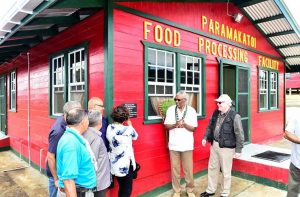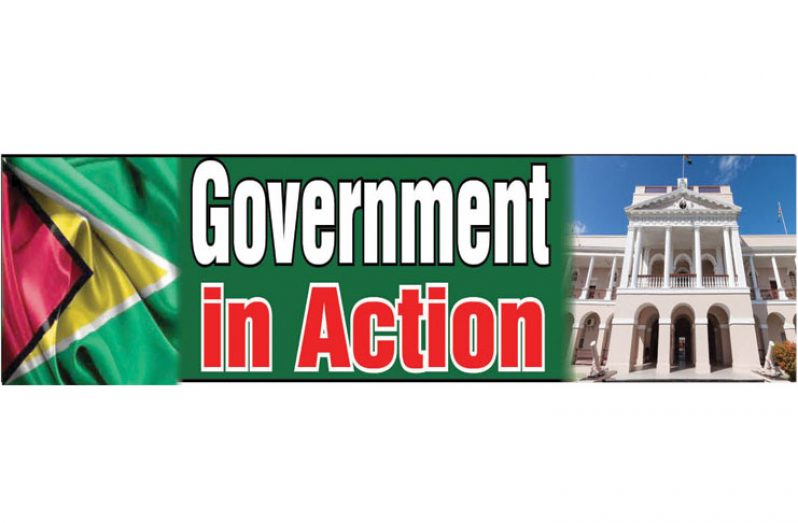Employment is essential to human development as it provides financial resources for the generation of sustainable livelihoods, thereby improving the standard of living and quality of life of people. In Guyana, youth unemployment remains a central issue affecting young people. Recognising this, President David Granger and his administration have designed a two-pronged approach to youth empowerment in the forms of entrepreneurship and education.
In this week’s Government in Action, we will take a look at the Government’s efforts aimed at not only creating jobs, but the promotion of agro-processing and entrepreneurship and the opportunities and financial support available for young entrepreneurs, particularly at the Small Business Bureau (SBB), the Ministry of Social Protection and through other programmes facilitated by the various Ministries.
Empowerment through Entrepreneurship

While training and vocational education will no doubt empower a generation of talented young people, who in most cases just need a second chance, this administration has demonstrated that it is interested in inculcating a culture of industry and entrepreneurship. In this regard, programmes have been developed to provide the necessary support for budding entrepreneurs, while others focus on skills training to aid in employment ability.
In the area of entrepreneurship, programmes such as the Linden Enterprise Network (LEN), which was launched in December 2016, provide support to young people aspiring along these lines. The programme provides entrepreneurs across Linden and other parts of the Upper Demerara-Upper Berbice region the opportunity to access loans to further expand or consolidate their businesses. At that event, President Granger in his address to the entrepreneurs said that the programme will open new doors for occupation through self-employment, adding that there are four pillars necessary for enterprise: investment, information, infrastructure and innovation.
The President said that the government wants to create an environment, which can provide the facilities for young people to be self-employed.
“We are bringing all the youth programmes together to have a common core curriculum so that every child, whether or not he or she is a school dropout, who enters that programme will get common training, which will prepare him or her to get employment in Guyana. I don’t like to see young children, some of them who have left secondary school in the Rupununi for example, drifting over to Brazil to do menial work. I think they can stay here and get a good living, not only because oil is on the horizon but because we can produce practically every food that the Eastern Caribbean needs. The country is wide open and it is open to you… Your education will not only equip you for employment but it will also equip you for entrepreneurial activities so that you can become rich,” the Head of State said at a youth luncheon held at State House in January 2018.

Another has been the SLED initiative, which was launched in September 2016 by the Government of Guyana under the Ministry of Communities as a means of introducing job-creation measures to promote micro and small-scale enterprises so as to open opportunities for the disadvantaged and the county’s youth. Through this initiative, scores of young people are given the chance to tap into resources that allow them to become business owners. The initiative has, since its implementation, enabled more than 100 youth business start-ups from among the Essequibo Islands-West Demerara (Region Three), Demerara-Mahaica (Region Four), Mahaica-Berbice (Region Five), East Berbice-Corentyne (Region Six) and the Upper Demerara-Upper Berbice (Region 10) regions.
President David Granger, who delivered the feature address at that event, said that the answer to tackling unemployment can be found through investments in education and entrepreneurship and the SLED initiative is a part of that investment.
“The SLED Initiative is part of a programme that reinforces the administration’s efforts to stimulate economic development in communities, especially at the grass root level. It has provided training, mentorship, business development skills and start-up grants to individuals and groups,” President Granger said on that occasion.
Minister of Communities, Mr Ronald Bulkan, in his remarks, said the origin of the SLED Initiative is contained in the vision of President David Granger, who at the time of expressing this vision was Opposition Leader, and who spoke of the challenges facing the country’s young people, including the high rate of unemployment. He said that the beneficiaries and entrepreneurs were among the first to take advantage of this helping hand offered by the Government.
“This initiative tries to ensure that we don’t leave anyone out of the loop of having that better life. Every intervention ensures that there is a level of training, mentoring and technical support, even after the project is completed. Building the capacity, ability and the right to earn and sustain a livelihood of the most vulnerable in society would be futile and unsustainable, if that is not complemented by institutional strengthening at a local government and community level that can offer support mechanisms and services to strengthen local economic activities at a grassroots level,” he said.
Small Business Bureau
In his 2018 National Budget presentation, Minister of Finance, Mr Winston Jordan said that the David Granger-led Administration recognises the important role that entrepreneurship and by extension, the private sector, play in generating employment and income. It is imperative, therefore, that the Government continues to strengthen the fabric of micro and small businesses, especially those owned by vulnerable groups, through the alleviation of prohibitive constraints, he said. This is where the Small Business Bureau (SBB) plays a critical role.

Chief Executive Officer of the SBB, Dr. Lewell Porter, in an interview with the Public Information and Press Services Unit of the Ministry of the Presidency, said that the agency is mandated to not only assist small businesses to develop but is also responsible for helping them to access financing for their businesses and to advocate for Policy development, which can grow and develop this sector.
In terms of financing, Dr Porter said that the Bureau provides grants starting from $300,000 to one million dollars to young entrepreneurs, who have viable ideas once they fulfil the established requirements.
“We require you to, first of all, be a registered kind of the small business and when you do that, we verify a couple of things because the Small Business Act defines the small business as any business that has less than 25 employees and the gross annual revenues is less than 16 million and the business assets is less than $20 million so as long as you meet two of those requirements, you can be registered as a small business. You come to us with a business side to your plan. We will sit down with you and try to understand the viability and the sustainability of that plan and if you benefit for a loan or a grant. Grants are usually for startupS to just give it that impetus to continue in their effort, so the grant process is simple access for the grant. We will come to do a site visit to ensure that you are who you say, whatever you said to us is correct, this is our verification process and then from that, we come back and there is a committee that meets and then they say whether that persons get a grant or not,” Dr. Porter said.
In addition to this, the SBB helps small business owners to access loans at Republic Bank Limited and the Guyana Bank and Trade Industry (GBTI) for the expansion of their businesses.
The SBB provides the technical assistance in completing the application and helping the individual to acquire all necessary documentation to access a loan. It also issues a referral letter to the bank for the client. In addition to this, it provides 70 per cent of the capital for the small business borrower.
Dr Porter noted that since the inception of the programme in 2014, approximately 173 loans have been approved and more than 530 grants given out. For 2018 alone, more than 50 grants have been approved and 17 loans facilitated.
Approximately 40 percent of the Bureau’s clients are young people between the ages of 18-35. The CEO said that the SBB recognises that young people play a critical role in the development in the country and in most cases, need someone with the financial capabilities to support their creativity and vision. The Small Business Bureau, he said, is more than happy to play this role.
“I think the Small Business Bureau has an exceptional role here in the development of small businesses. Let’s say specifically youth, I personally believe that small businesses are the backbone of any economy and with all these business ideas that we have floating around, if we look back at some of the richest persons in the world today they had a simple idea, their ideas were sometimes shut down but then somebody came up and said “you know what? Let me put 10,000 into your fund to help you”. So, in the same way, we’re trying to help you, so it’s young people we are targeting to come up with all of these fantastic ideas and to see how we can help them grow. So come down to us, let us help our young people to develop into something fantastic,” he said.
In addition to financing opportunities, the Bureau also arranges training sessions for small businesses owners to hone their skills. While specialised training are offered in some areas, it also focuses on generic business training areas including how to develop a business idea, how to write a business plan, how to record financial information, marketing and dealing with clients.
“We also do specific business training. We have a sustainable mining programme, sustainable forestry training. We did cosmetology training because we believe that there is a need for having a higher level of cosmetologists here in Guyana so we hired a consultant from the United States and it was excellent. An excellent programme, free of cost for everybody attending. We just don’t want to be able to say that we gave out twenty million in loans but what was done with that money, we want to make sure that it is contributing to the betterment of those entrepreneurs,” the CEO said.
Minister Jordan in his Budget 2018 speech, said that additional support to micro and small businesses will be delivered in 2018, through the creation of business incubators and accelerators in Regions 5 and 9 at a cost of $36 million. These structures will foster the growth of businesses by facilitating the provision of support services, such as business registration, documentation, and capacity building.
Meanwhile, the sum of $100 million has been allocated in Budget 2018 to replenish the Small Business Development Fund. This will be managed by the SBB.
Empowerment through Education
Education also plays a critical role in empowering young minds to pursue ventures and opportunities, which can provide them with a means of income and independence. That is why the Government has been placing heavy emphasis on access to education and providing opportunities for empowerment even to those who have dropped out of school.
In his 2018 Budget presentation to the National Assembly, Minister of Finance, Mr. Winston Jordan said that the Government acknowledges that youth represent a significant proportion of Guyana‘s population and that the future success and growth of Guyana depends on how equipped this section of the population is to handle emerging and future challenges. The Government, he said, stands resolute towards ensuring that concerted efforts are made in satisfying the needs of young people. In this regard, Government‘s approach to the development of our young people is based on the twin pillars of youth empowerment; and youth employment and entrepreneurship.
“In relation to Youth Employment, several initiatives have been, and are currently being, rolled out to ensure that our young people are gainfully employed in environments where their skill sets can be readily applied, and where they can make meaningful contributions. The Youth Innovation Project of Guyana (YIPoG), Youth Entrepreneurial Skills Training (YEST), Sustainable Livelihood and Entrepreneurial Development (SLED) Programme, and the Hinterland Employment and Youth Scheme (HEYS), are programmes designed to ensure that youth attain the relevant skill-set that is required for the job market, either to become employable or be their own bosses. Taken together, in 2018, Government will be investing over $1.7 billion on youth programmes,” he said.
One such initiative which looks at vocational training is the Hinterland Employment Youth Service (HEYS), which was launched in October 2016. This is an exchange programme where persons teach, discuss, learn and exchange experiences and knowledge in order to improve their standard of living and contribute positively to the development of their communities.
The programme includes training and capacity-building in several key areas including plumbing, carpentry, sewing and wiring among many other vocational areas. It targets 2000 youth in 106 communities across the hinterland regions and is in keeping with President Granger’s promise of improving lifestyles and standards of living for youth and young adults who reside in the hinterland.
Then there’s the Youth Innovation Project, which seeks to engender creative thinking amongst youth, and provides grant resources up to $2 million to finance innovative solutions. In and out of school youth, between the ages of 16-35, are benefitting from this programme.
“The project, which operates under the theme, ?Aspire, Inspire to reach?, was designed to decrease unemployment among youth; engage youth in the development of a green state; and foster creative thinking for problem solving through Science, Technology, Engineering, Agriculture, Anthropology, Archaeology, Architecture, Arts, Mathematics and Spirituality. In this regard, Government has invited youth to submit proposals for financing,” the Minister of Finance noted.
Supporting the Youth
It is imperative that the Government creates and maintain institutions, which can provide young people with vocational and technical skills that can make them marketable, thereby improving their quality of life. This is where the Board of Industrial Training plays a critical role.
Chairman of the Board, Mr. Clinton Williams, in an interview with the Public Information and Press Services Unit of the Ministry of the Presidency said that in addition to running an apprenticeship programme, since 2005 it has been offering training programmes in a number of areas, which caters to primarily vulnerable youths in society and school dropouts.
“That has in fact been our main focus; to train people with those skills that are required by the various sectors in the country. That programme has generated thousands of skills in various skills profiles. We categorise them as technical, commercial and clerical skills and so on, welding, fabrication, carpentry, mechanical engineering, and a whole host of other skills. We have been tracing what happened to those skills that we produce and also where they are employed and who employs them and so far, 65 percent of those we have trained are gainfully employed,” he said.
For the past 18 years, the organisation has generated over 20660 artisans and semiskilled workers that have been added to the workforce. Additionally, the renewed focus of training implemented under the National Training Project for Youth Empowerment (NTPYE) programme has shaped the opportunity for the beneficiaries to gain entry into the regular programme of recognised Technical and Vocational Education Training (TVET) institutions, such as the Mahaicony Technical Vocational Educational Training Centre in Region 5, the New Amsterdam Technical Institute and the Leonora Technical and Vocational Training Centre in Region Three.
The Board has also worked alongside the Office of the First Lady to train students from villages in Regions 4 and 10 in information and Communication technology. The Chairman said that plans are in train to take the programme to other vulnerable communities across the country.
“We are very happy to work with her [the First Lady] to generate skills particularly in vulnerable areas, for out of school youths in communities that are considered to be vulnerable and we have done programmes in Region 4 and this year we will be working in Agricola, Linden, Region Three and Region Nine and they are intended to satisfy some requirements to ensure employable skills and poverty alleviation and improve economic independence,” Mr. Williams said.
Mr. Williams explained that the certificates received by the students are regionally and internationally accepted and provides an opportunity for young people to not only be gainfully employed but to also become entrepreneurs.
“Our programmes are so intense in terms of the quality assurance that we believe that whenever we issue a certificate, then that certificate gains acceptance and recognition by a number of agencies and countries. We have now moved on based on an arrangement we have with the Caribbean National Training Agency (CANTA) and the Caribbean Community (CARICOM) Secretariat to now award the CARICOM Vocational Qualification (CVQ). All those programmes ultimately will have substantial marketability in the sense that we can use them to gain employment not only in Guyana but elsewhere so the recognition is assured,” he said.
For 2018, BIT plans to implement its NTPYE programme in 18 areas across the 10 administrative regions of Guyana in the areas of block making/masonry, boat building, electrical installation, Fitting Machine, Food Preparation, Garment construction, General Building Construction, Heavy Duty Equipment Operation, Information Technology, Motor Vehicle Repairs, Plumbing, Refrigeration/Air Condition, Small Engine Repairs, Supervisory Training and Welding and Fabrication.
Additionally, during the year BIT is scheduled to commence the implementation of training for the Basic Needs Trust Fund (BNTF) in Boat Building, General Building Construction, Heavy-Duty Equipment Operator Maintenance and Repair, JAWS Computer Training for Persons with Visual Disabilities, Small Engine Repairs and Solar Photovoltaic training in installation, maintenance and repair of Solar Photovoltaic equipment. These trainings will be implemented in all 10 administrative regions and is expected to realise the empowerment of approximately 1400 persons.
The Board is also looking to partner with the University of Guyana to accept the students exiting its training programmes since they are brought up to the entrance level requirements through the rigorous training programmes.
Such initiatives will help to mould Guyana’s future and they reinstate the government’s commitment to ensuring ‘a good life for all’ through education, employment and enterprise. Moreover, as time progresses, through the government’s commitment, we will see the introduction of more such programmes that aim to ensure that the country’s young people indeed get the chance to enjoy this good life. The President believes that such initiatives help in overcoming the problem of unemployment and will also help to create a generation of young people who will become the new entrepreneurial class.




.jpg)









